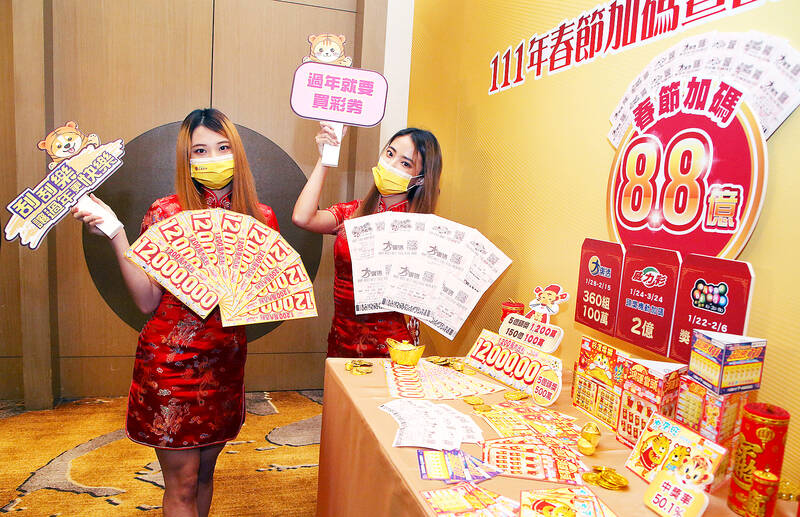To celebrate the upcoming Year of the Rabbit and boost sales, Taiwan Lottery Co is to add NT$900 million (US$29.6 million) in prize money to the jackpots of several lotteries.
Taiwan Lottery board member and company spokesperson Huang Chih-yi (黃志宜) and actress Vivian Sung (宋芸樺), who has appeared in television advertisements promoting the Lunar New Year holiday sales campaign, introduced the increased prize money at a news conference on Thursday.
The amount available would be the highest in six years, with major lotteries such as the Lotto 6/49, the Super Lotto and BINGO BINGO boasting much larger jackpots, Huang said.

Photo: CNA
The additional prize money for Lotto 6/49, which is the most popular lottery run by Taiwan Lottery, would be distributed in two parts according to the standard practice, Huang said.
The first part would be through a daily draw held by Lotto 6/49 for 17 consecutive days from Friday next week to Feb. 5, the longest period of daily draws in the lottery’s history, surpassing the 15 daily draws held over the 2021 Lunar New Year.
The Lotto 6/49, which requires ticket buyers to pick the correct six numbers from a total of 49 numbers to win the top prize, is usually held every Tuesday and Friday.
The second part would be through special 360 draws held from Friday next week to Feb. 5, Huang said.
For the special draws, buyers pick six numbers, and nine winning numbers would be drawn, Huang said, adding that those who have any six of the nine winning numbers would win NT$1 million or share the prize money with other buyers who also have six winning numbers.
As for the Super Lotto, ticket holders must have six winning numbers drawn from 38 numbers in the first set, and one winning number out of eight numbers in a second set to win the top prize, he said.
If the accumulated lottery jackpot for the top prize falls below NT$300 million, Taiwan Lottery would add NT$200 million to the jackpot from Monday next week to March 16, Huang said.
Taiwan Lottery would also add prize money for BINGO BINGO, in which lottery ticket buyers bet on a big or a small number, an odd number or an even number in the tickets, Huang added.
Taiwan Lottery also unveiled seven new lottery scratch cards designed for the Lunar New Year, including the NT$12 million Big Fortune, which sell for NT$1,000 each, with a top prize of NT$12 million.
The winning rate for the NT$12 million Big Fortune would be about 70 percent this year if all cards are sold, which is about the same as last year.
The seven new lottery scratch cards, which would be on sale until July 12, have more than NT$10.8 billion in aggregate jackpots and a total of 18.78 million prizes, Taiwan Lottery said.
As concerns over COVID-19 infections fell in the second half of last year and Taiwan Lottery boosted its marketing efforts, the company generated NT$133.1 billion in sales last year, the second-highest in its history, Huang said.
Last year, revenue posted by computerized lotteries such as the Lotto 6/49 and the Super Lotto fell 4.3 percent from a year earlier to NT$64.4 billion, while sales generated by lottery scratch cards grew 6.7 percent to NT$68.7 billion, he added.

A preclearance service to facilitate entry for people traveling to select airports in Japan would be available from Thursday next week to Feb. 25 at Taiwan Taoyuan International Airport, Taoyuan International Airport Corp (TIAC) said on Tuesday. The service was first made available to Taiwanese travelers throughout the winter vacation of 2024 and during the Lunar New Year holiday. In addition to flights to the Japanese cities of Hakodate, Asahikawa, Akita, Sendai, Niigata, Okayama, Takamatsu, Kumamoto and Kagoshima, the service would be available to travelers to Kobe and Oita. The service can be accessed by passengers of 15 flight routes operated by

Alain Robert, known as the "French Spider-Man," praised Alex Honnold as exceptionally well-prepared after the US climber completed a free solo ascent of Taipei 101 yesterday. Robert said Honnold's ascent of the 508m-tall skyscraper in just more than one-and-a-half hours without using safety ropes or equipment was a remarkable achievement. "This is my life," he said in an interview conducted in French, adding that he liked the feeling of being "on the edge of danger." The 63-year-old Frenchman climbed Taipei 101 using ropes in December 2004, taking about four hours to reach the top. On a one-to-10 scale of difficulty, Robert said Taipei 101

MORE FALL: An investigation into one of Xi’s key cronies, part of a broader ‘anti-corruption’ drive, indicates that he might have a deep distrust in the military, an expert said China’s latest military purge underscores systemic risks in its shift from collective leadership to sole rule under Chinese President Xi Jinping (習近平), and could disrupt its chain of command and military capabilities, a national security official said yesterday. If decisionmaking within the Chinese Communist Party has become “irrational” under one-man rule, the Taiwan Strait and the regional situation must be approached with extreme caution, given unforeseen risks, they added. The anonymous official made the remarks as China’s Central Military Commission Vice Chairman Zhang Youxia (張又俠) and Joint Staff Department Chief of Staff Liu Zhenli (劉振立) were reportedly being investigated for suspected “serious

Taiwanese and US defense groups are collaborating to introduce deployable, semi-autonomous manufacturing systems for drones and components in a boost to the nation’s supply chain resilience. Taiwan’s G-Tech Optroelectronics Corp subsidiary GTOC and the US’ Aerkomm Inc on Friday announced an agreement with fellow US-based Firestorm Lab to adopt the latter’s xCell, a technology featuring 3D printers fitted in 6.1m container units. The systems enable aerial platforms and parts to be produced in high volumes from dispersed nodes capable of rapid redeployment, to minimize the risk of enemy strikes and to meet field requirements, they said. Firestorm chief technology officer Ian Muceus said